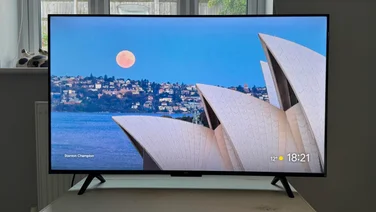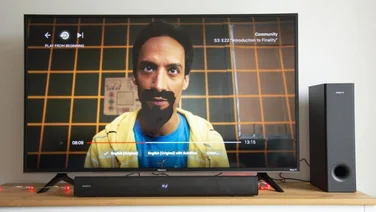To help us provide you with free impartial advice, we may earn a commission if you buy through links on our site. Learn more





A soundbar is a great way to improve the audio quality from your TV, and DVD or Blu-ray player, without having to clutter up your room with speakers. With the M12, the latest in its range of soundbars, a model which sits just ouside the budget soundbar price range, Orbitsound believes it has the best and most cinematic product yet.
As with previous Orbitsound soundbars, the M12’s trick is its spatial stereo. This patented technology is designed to fill a room with sound, eliminating the positional sweet spot that you usually get with regular 2.1 systems.The M12 is also designed to be more flexible and easier to use, thanks to a shift to wireless technology. This includes Bluetooth rather than an iPod dock, so you can play music from practically any smartphone or tablet; and a wireless subwoofer, which is easier to place than a traditional wired model. Of course, there’s an optical S/PDIF input, so you can hook your TV straight up to the M12 and run all audio through the soundbar. If your TV doesn’t have the necessary output, there are also stereo 3.5mm and stereo phono analogue inputs.

Wireless subwoofers are hard to get right, as a digital wireless connection has delay (latency). If this delay exceeds 30ms, the subwoofer sounds out-of-sync with the rest of the audio. This can be fixed by delaying the audio from the soundbar, but this can then cause lip-sync problems, which you’d have to adjust for using your TV’s controls, if available.

To counter this and keep real-time audio, Orbitsound has installed hi-gain antennas in the soundbar and subwoofer, which has allowed it to reduce the size of the digital transmit and receive buffers. The result is that sound is delayed by less than 10ms, so there are no problems with lip sync.
While improved technology is one thing, it’s the sound quality that really counts. As this soundbar is primarily designed for home entertainment, we first put it through its paces with films. There are four 2.5in main drivers and two 1in tweeters at the front, while two 2in full-range drivers at the side provide the spatial stereo.

We have to say that the M12 sounds great and it’s very-well balanced, with the subwoofer blending neatly with the soundbar without overwhelming it. Sound effects in Star Trek sounded great, with explosions given real depth by the subwoofer.
There’s no pseudo-surround sound in the M12 and it uses its spatial stereo technology to fill a room with audio, so that it sounds as though its coming from all around you. It certainly fills the room and gives the impression that what you’re watching is surrounding you. This removes the directionality problems of a traditional soundbar, coming closer to a 5.1 system in terms of immersion. However, a 5.1 system’s directional system works better, as they can create sound effects around, in-front and behind you.
You still get excellent stereo separation with the M12, though. Objects moving across the picture, sound as though they’re flying from left-to-right or vice versa. With the surround all around you, this stereo effect helps keep you engrossed in what you’re watching.
The one place that we think that M12 misses out, is not having a dedicated centre channel for speech. By its nature, this is inherently positional and should sound like it’s coming from the TV’s location. Soundbar’s with a centre speaker also sound a little clearer, for our liking, making dialogue easier to understand.
As well as for movies and TV, you can also hook up your phone or tablet for music. Bluetooth is the easiest and most convenient way of doing this, as you can carry around your mobile device and use it as a remote control for selecting content. It’s standard Bluetooth A2DP and the CD-quality apt-X codec isn’t supported; however, in our tests we were hard-pushed to tell the difference between listening via Bluetooth and via a 3.5mm line-in, and we prefer the convenience of the wireless connection.
Sound is excellent, with the M12 picking up every nuance and detail in all the tracks we listened to. From the subtle detail in percussion instruments to full on crunching guitars, the M12 copes with it all. It’s got plenty of volume, too, going to massive volumes that will fill the biggest room without distorting. Thanks to spatial stereo, you get the same clear sound no matter where you’re staying, making it a pleasure to listen to any music. Overall, the sound is that bit clearer and more detailed than the previous-generation T12v3.
The remote control is the same that Orbisound has used for the last couple of generations of products. It’s clearly-labelled and responsive, providing all the controls you need: input selection, bass and treble. It’s also got playback controls, although you probably won’t need them, as it’s easier to select tracks and play/pause from your mobile device.

You can also change input and adjust volume using the controls on top of the sound bar.

Orbitsound has also tweaked the M12 from previous products to make using it a smoother experience. Switch inputs, for example, and the current input fades out, before the new one fades in. There’s even a party volume mode, so if you were listening to the M12 really loud the night before, when you turn it on the next day, it resets to a quieter volume to avoid any nasty shocks. We’re pleased to say that all settings are stored in pervasive memory, so a power-cut won’t cancel out your finely-tuned audio.
There’s no denying the quality of the M12 and it sounds fantastic. However, it’s up against some strong competition. A dedicated home cinema soundbar with a centre speaker, such as the Sonos Playbar makes dialogue a little clearer at the expense of immersive sound. We actually slightly prefer the smaller Orbitsound M9 soundbar. It’s around £100 cheaper, but has very similar sound and is perhaps a little better for music, making it the slightly better buy in our opinion.
| Specifications | |
|---|---|
| Rating | **** |
| Speaker configuration | 2.1 |
| RMS power output | 300W |
| Power consumption standby | 1W |
| Power consumption on | 12W |
| Analogue inputs | 3.5mm stereo, stereo phono |
| Digital inputs | optical S/PDIF, Bluetooth |
| Dock connector | none |
| Headphone output | none |
| Satellite cable lengths | N/A |
| Cable type | N/A |
| Controls located | main unit, remote control |
| Digital processing | N/A |
| Tone controls | bass and treble |
| Price | £400 |
| Details | www.orbitsound.com |






